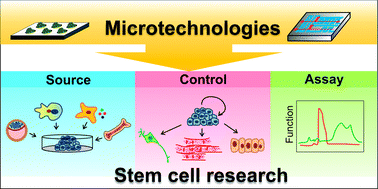Advancing stem cell research with microtechnologies: opportunities and challenges
Abstract

Maintenance work is planned for Wednesday 1st May 2024 from 9:00am to 11:00am (BST).
During this time, the performance of our website may be affected - searches may run slowly and some pages may be temporarily unavailable. If this happens, please try refreshing your web browser or try waiting two to three minutes before trying again.
We apologise for any inconvenience this might cause and thank you for your patience.
* Corresponding authors
a Research Laboratory of Electronics, Massachusetts Institute of Technology, 77 Massachusetts Aveneu, Cambridge, USA
b
Department of Electrical Engineering and Computer Science, Massachusetts Institute of Technology, Room 36-824, 77 Massachusetts Ave, Cambridge, USA
E-mail:
voldman@mit.edu

 Please wait while we load your content...
Something went wrong. Try again?
Please wait while we load your content...
Something went wrong. Try again?
 Fetching data from CrossRef.
Fetching data from CrossRef.
This may take some time to load.
Loading related content
